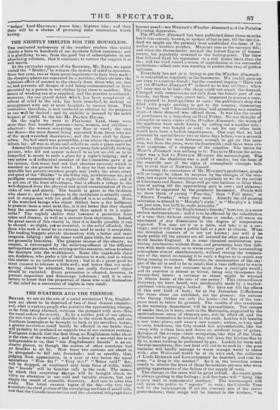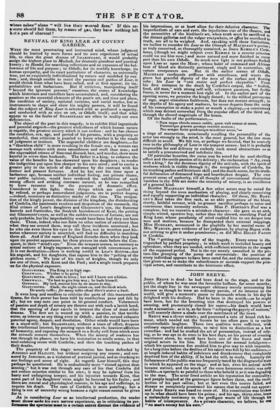THE WEATHER AND THE FIRESIDE.
READER, we are on the eve of a social revolution I Yes, English- men are about to be deprived of two of their dearest comforts; and, what is curious, people who perceive the approaching change, so far from being alarmed, welcome the prospect with more than the usual ardour for novelty. If, by a sudden jerk of our sphere, the sun were to show a cold shoulder to the warm South, and our Northern hemisphere be brought to bask in his meridian beams, a greater revolution could hardly be effected in our habits than will probably be produced as regards two of our national customs. Foreigners remark that the first thing an Englishman talks about is the state of the weather ; and the solace of a sea-coal fire is so Indispensable to us, that " the Englishman's fireside" is an ex- clusive phrase, as though the natives of other countries had no firesides to sit by. Now these two customs are about to be abrogated—to fall into desuetude; and so speedily, that, Judging from appearances, in a year or two hence the usual salutations " Fine day !" " Very wet !" " Bitter cold!" &c., will be dropped, or continued only from force of habit, while the " fireside" will be familiar only to the cook. The means by which this surprising change will be brought about, in- volve no alteration in our cold and variable climate, but are simply the result of scientific discovery. And now to solve this riddle. The latest current topics of the day—the two that constitute the chief portion of the circulating medium of small talk, now that the Canada insurrection and the electrical telegraph have become passé—are MURPHY'S Weather Almunack and the Portable Warming Apparatus. The Weather Almanack has been published these three months but it was scarcely known, or spoken of but in jest, till the late (in- deed we might say the present) frost established the fame of its author as a weather prophet. MURPHY rose as the mercury fell ; and when the thermometer marked the lowest degree of tempe- rature, his popularity mounted to the boiling-point. The thaw that followed fixed his reputation on a still firmer basis than the ice; and the wind roared a storm of approbation at his successful predictions—albeit rain was wanting to perfect this crop of golden opinions.
Everybody has got or is trying to get the Weather Almanack : it is consulted as regularly as the barometer. We readily gave up our copy to a curious friend ; but the constant inquiry " Have you got the Weather Almanach r induced us to buy another ; when lo! none was to be had—the shops could not supply the demand. Charged with commissions not only from the female part of our friends, but from " sage, grave men," impatient to possess a copy, we repaired to head-quarters at once: the publisher's shop was filled with people pushing to get to the counter, clamouring for " dozens" and " five-and-twenties," and grumbling as a number short ef their demand was offered them. It was like the crowd of purchasers in a bun-shop on Good Friday. No one thought of asking for so many copies of the Weather Almanack ; the wants of the applicant were made known by calling out a number only : nothing else was bought or sold; to ask for any other book would have been a foolish impertinence. One copy that we had procured by special favour two or three days before, was a seventh edition; those we were fortunate enough to get on this occa- sion, wet from the press, were the fourteenth; and there were evi- dent symptoms of a stoppage of the supplies. The mania for Moore's Almanack was nothing to it: FRANCIS MOORE the astro- loger was a fool to PATRICK MURPHY the meteorologist. The celebrity of the charlatan was a puff of smoke; but the fame of the scientific seer of the signs of atmospheric changes bids fair to rival that of NEWTON himself .
Assuming the correctness of Mr. MURPHY'S predictions, people will no longer be taken by surprise by the changes of the wea- ther, but expect their recurrence as regularly as we do the arrival of Christmas and Easter. Ships will go into harbour or delay their time of sailing till the approaching gale is over ; and pleasure- trips will be regulated by the prophetic barometer. People will no more think of saying " Fine day," than " Full moon," or " Shrove Tuesday," when they meet. Already the old passing salutation is altered to " Murphy's right," or "Murphy's a little out just now, but he'll be right presently." The abolition of " the Englishman's fireside," however, is a more serious metamorphosis : and it is to be effected by the substitution of a vase that, without emitting flame or smoke, will warm an apartment of any dimensions to the degree of temperature required. You may set it on a table, and take it in a car- riage; and it will warm a public ball or a pew at church. What the invention consists of is not yet known; nor will it be made public till the patents are all secured for other parts of the world besides England. It is some chemical combination pro- ducing combustion without flame, and generating heat that radi- ates with such velocity as to warm every part of the surrounding atmosphere almost simultaneously, without raising the tempera- ture of the metal containing it to such a degree as to scorch any thing coming in contact. Moreover, its consumption of the oxy- gen of the air is said to be so small, that a vase sufficient to warm a large room does not consume more than a rushlight would; and its expense is almost as trivial, being only threepence for twenty-four hours: a carriage or closet might be warmed for fifteen hours at the rate of one penny ! This extraordinary discovery, we have heard, was accidentally made by a market- gardener while opening a hotbed. We have not felt the effects of this new kind of heat ; for at the Jerusalem Coffeehouse the vases alone are exhibited, not the process : the curious who throng thither see only the bottle—the feat of the con- juror must be taken for granted. The results of this revolution in the warming department will be extraordinary. The canopy of smoke that,as it were, roofs in the Metropolis, supported by the multitudinous array of chimney-pots, will be lifted off, and the chimnies themselves be levelled to the roofs. London will breathe a new atmalphere, and wear a new aspect ; unless, so long used to sooty blackness, the City should feel uncomfortable, like the sweep with a clean face, and desire an artificial tinge of grime. Apropos of the sweeps—their occupation, like that of the black Othello, will be gone; though they will have the kitchen-flue to fly to, unless cooking be performed by gas. Luckily for them and the coal-merchants, this new heat will not do to cook by : the poor bachelor will hardly manage to warm enough water to shave with ; else Walls-end would be at its wit's end, the collieries ef Lords DURHAM and LONDONDERRY be deserted, and coal be- come " a drug in the market." As it is, the invention comes timely to silence the fears of those far-anxious persons who were getting apprehensive of the failure of the supply of coals. The change in the stove will be great indeed. An empty grate is always grating to the feelings ; and fire-irons will " hang like a rusty mail in monumental mockery." The ironmongers will call upon the public to " register" in vain ; the Calorific Vase will be the lachryinatory if not the cinerary urn of the stove- grate-makers ; their range will be limited to the kitchen, "in
whose ashes" alone " will live their wonted fires." If this re- alurce should fail them, by reason of gas, they have nothing left bat a pan of charcoal !



























 Previous page
Previous page